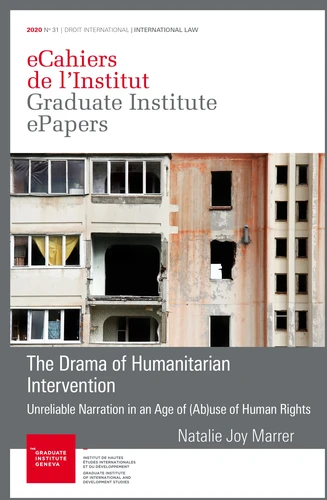The Drama of Humanitarian Intervention. Unreliable Narration in an Age of (Ab)use of Human Rights
Par :Formats :
Disponible dans votre compte client Decitre ou Furet du Nord dès validation de votre commande. Le format Multi-format est :
- Pour les liseuses autres que Vivlio, vous devez utiliser le logiciel Adobe Digital Edition. Non compatible avec la lecture sur les liseuses Kindle, Remarkable et Sony
 , qui est-ce ?
, qui est-ce ?Notre partenaire de plateforme de lecture numérique où vous retrouverez l'ensemble de vos ebooks gratuitement
Pour en savoir plus sur nos ebooks, consultez notre aide en ligne ici
- FormatMulti-format
- ISBN978-2-940600-19-9
- EAN9782940600199
- Date de parution28/08/2020
- Protection num.NC
- Infos supplémentairesMulti-format incluant PDF avec W...
- ÉditeurGraduate Institute Publications
Résumé
This ePaper approaches looks at the contentious debate surrounding humanitarian intervention through a critical, narratological lens. By questioning the roles cast and identities constituted, in what can could be compared to a theatrical drama, the focus is on given to the unreliable narration by of the most powerful characters on the international stage -, from the US to the UN -, and its impact on the political and legal stances taken in various contexts.
On a meta-level, it examines the conditions which that enable this unreliable narration, by pointing to the out a problematic flexibility owing to the flowing from paradoxes and conflation nestled entrenched in human rights rhetoric; and what some deem call a budding 'humanity's law'. Attention is meant to be drawn to the power of mental imagery conjured up by intervention narratives, based on the story of saving innocents, as embodiments of humanity.
The goal is to foster self-reflection among of the readers of working in humanitarian intervention, within the epistemic community of international lawyers, and beyond. We extend our heartfelt thanks to the Vahabzadeh Foundation for financially supporting the publication of best works by young researchers of the Graduate Institute, giving a priority to those who have been awarded academic prizes for their master's dissertations.
On a meta-level, it examines the conditions which that enable this unreliable narration, by pointing to the out a problematic flexibility owing to the flowing from paradoxes and conflation nestled entrenched in human rights rhetoric; and what some deem call a budding 'humanity's law'. Attention is meant to be drawn to the power of mental imagery conjured up by intervention narratives, based on the story of saving innocents, as embodiments of humanity.
The goal is to foster self-reflection among of the readers of working in humanitarian intervention, within the epistemic community of international lawyers, and beyond. We extend our heartfelt thanks to the Vahabzadeh Foundation for financially supporting the publication of best works by young researchers of the Graduate Institute, giving a priority to those who have been awarded academic prizes for their master's dissertations.
This ePaper approaches looks at the contentious debate surrounding humanitarian intervention through a critical, narratological lens. By questioning the roles cast and identities constituted, in what can could be compared to a theatrical drama, the focus is on given to the unreliable narration by of the most powerful characters on the international stage -, from the US to the UN -, and its impact on the political and legal stances taken in various contexts.
On a meta-level, it examines the conditions which that enable this unreliable narration, by pointing to the out a problematic flexibility owing to the flowing from paradoxes and conflation nestled entrenched in human rights rhetoric; and what some deem call a budding 'humanity's law'. Attention is meant to be drawn to the power of mental imagery conjured up by intervention narratives, based on the story of saving innocents, as embodiments of humanity.
The goal is to foster self-reflection among of the readers of working in humanitarian intervention, within the epistemic community of international lawyers, and beyond. We extend our heartfelt thanks to the Vahabzadeh Foundation for financially supporting the publication of best works by young researchers of the Graduate Institute, giving a priority to those who have been awarded academic prizes for their master's dissertations.
On a meta-level, it examines the conditions which that enable this unreliable narration, by pointing to the out a problematic flexibility owing to the flowing from paradoxes and conflation nestled entrenched in human rights rhetoric; and what some deem call a budding 'humanity's law'. Attention is meant to be drawn to the power of mental imagery conjured up by intervention narratives, based on the story of saving innocents, as embodiments of humanity.
The goal is to foster self-reflection among of the readers of working in humanitarian intervention, within the epistemic community of international lawyers, and beyond. We extend our heartfelt thanks to the Vahabzadeh Foundation for financially supporting the publication of best works by young researchers of the Graduate Institute, giving a priority to those who have been awarded academic prizes for their master's dissertations.



